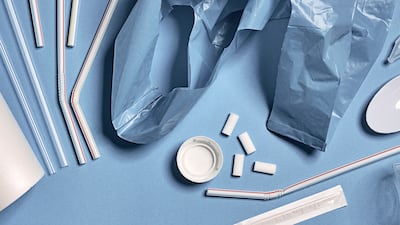Controversy has been sparked by a study that appears to show that when they break down, compostable plastic bags release more toxins into the environment than conventional plastic bags do.
European Bioplastics, which represents companies that produce various types of biodegradable plastics, has branded the research "scientifically questionable" and suggested that it does not replicate how plastics degrade in the real world.
The dispute highlights concerns over biodegradable plastics. To some, they are the answer to the world’s acute problem of plastic waste, but to others these materials are a distraction from what they see as the true answer – simply using less plastic.

What did the study find?
Carried out by scientists in Spain and released in the Journal of Hazardous Materials, the study involved testing the breakdown products of various types of plastic bag on zebrafish cells grown in the laboratory.
The researchers looked at compostable bags, which are a type of biodegradable plastic bag designed to break down under specific conditions, and compared them to conventional plastic bags.
It found that extracts of compostable bags decreased the viability of the cells, an effect that was made stronger if the bag had been exposed to ultraviolet light or had been composted.
However, similar remains from conventional plastic bags did not have the same toxic effect on the cells.
"These findings highlight the importance of investigating the effects of degradation mechanisms such as sunlight and composting on the toxicity of bioplastics," the researchers wrote in the Journal of Hazardous Materials.
"It is also crucial to investigate the composition of newly developed formulations for bioplastics, as they may be more harmful than conventional ones."
What criticism has been levelled at the study?
To extract chemicals from the plastics before they were tested on the zebrafish cells, the scientists used methanol, a type of alcohol.
In a statement issued this week, European Bioplastics said that there was no evidence in the study that the methanol did not change the chemical structure of the samples. As a result, the study, they suggested, may not reflect how these plastics behave in the real world.
Claims made by the Institute of Environmental Assessment and Water Research, one of the organisations behind the study, "are not supported by the scientific evidence", according to European Bioplastics.
"The study, including the test methods, and the sample-taking procedures, should be completely reassessed on their scientific correctness," the organisation stated.
According to Dr Costas Velis, a lecturer in resource efficiency systems at Leeds University in the UK who was not connected to the new study, "we need to understand better" what the degradation products from biodegradable plastics are.
"That’s a core takeaway message," he said. "I’ve seen [research] papers in that direction, but we need to start scrutinising the degradation products."
What are biodegradable plastics and are they the answer to the problem of plastic pollution?
Biodegradable plastics, such as packaging, cutlery, bottles and plates, can be made out of a wide variety of materials, including plant fibres (cellulose), starch (such as from sugar cane or corn) and agricultural waste.
Additional substances may be added to the starch, for example, to confer useful properties like resistance to the growth of microorganisms.
Biodegradable plastics are those that can be decomposed by living organisms, such as bacteria, and some are compostable, meaning that they can be turned into a substance that is rich in nutrients.
Conventional plastics, which are usually made from fossil fuels, may, by contrast, linger in the environment for hundreds of years, harming wildlife and often breaking down physically to leave behind tiny microplastic particles.
Typically, compostable substances break down into compost only under specific conditions. A Greenpeace report indicated that most must be industrially composted with particular humidity levels and temperatures above 50°C.

"Just because it’s marked as compostable, it doesn’t mean if you throw it outside, it will rot down in the same way as an apple core," Prof Phil Purnell, a professor of materials and structures at the University of Leeds in the UK, said.
Just as being marked as recyclable does not guarantee that something will be recycled, so being compostable does not mean, Prof Purnell said, that material will get composted.
"You have to have the hard infrastructure in terms of industrial composting facilities and soft infrastructure in terms of these things being collected and local systems in place, and these things being separated out," he said.
Are biodegradable plastics a match for conventional plastics in terms of what they can do?
According to Dr Velis, while the plastics sector is undergoing "a huge wave of innovation", not all new products have had solely positive effects.
He said that, for example, there is a concern that biodegradable plastic bottles made from polylactic acid or PLA could complicate recycling systems set up to deal with non-biodegradable bottles made from polyethylene terephthalate or PET.
"It’s very hard to distinguish them with the naked eye," he said. "With recycling systems, they have the ability to disrupt and destroy the flows of recycling materials."
Some environmental groups, including Greenpeace, have raised concerns that biodegradable plastics take attention away from what they see as the key solution, namely using less plastic.
Dr Velis said that with biodegradable plastics, there was not as wide a range of colours and textures when compared to conventional plastics.
"We haven’t seen this development of equivalent solutions of plant-based or degradable functional materials," he said.


